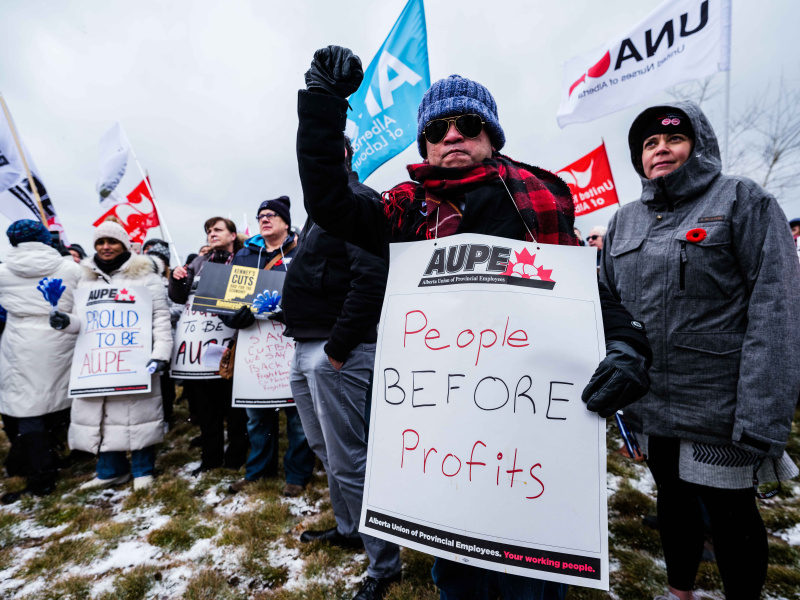Alberta's big sickness
The UCP is targeting three key health services that AUPE members have worked hard to protect from profiteers
Feb 01, 2020

Picture being pushed to the back of the line in the clinic because you can’t pay top dollars for a routine medical procedure. Or finding stains on your grandma’s fresh hospital bedding and having no recourse because they were washed at an offsite cleaning facility.
Now picture watching a loved one wait so long for life-saving surgery, that it’s too late.
Albertans might not have to imagine much longer. The UCP government has spent $2 million on an AHS Review which recommends up to $1.9 billion in cuts to health care.
This report recommends selling off Capital Care and Carewest to private providers. It recommends turning long-term care beds into designated assisted living beds, which provide lower levels of care and mean patients have to pay more because the often expensive medications would no longer be covered. The report also calls for reduced staffing levels in long-term care and much more.
For more details on what’s in the report, read the Member Update.
The stage is set. The UCP is poised to move ahead with privatizing Alberta’s health care, including hospital laundry, AHS’s environmental services, and provincial surgical clinics.
“Governments have outsourced these three services before, and each time their actions have proven an unmitigated disaster,” says AUPE vice-president Bonnie Gostola. “The UCP might think it’s above history lessons, but for our members who work in health care, and for the Albertans they support, the stakes are too high and these cautionary tales too important to ignore.”
Privatized laundry’s spotty past
Every single part of Alberta’s health-care system is important. Hospital laundry is no exception.
Saskatchewan’s residents found this out the hard way in 2015 when the province’s health authority sold off its publicly run laundry facilities, which serviced hospitals and nursing homes across the province, to multinational giant K-Bro, a private launderer that pocketed more than $6 million in profits between 2017 and 2018 alone.
As part of the deal, K-Bro collapsed Saskatchewan’s regional laundry facilities into one central plant, eliminated about 174 community jobs in the process, and reduced wages by about $10 per hour, according to one study.
Within months, disturbing stories about poor-quality cleaning practices made headlines as hospital workers reported finding debris, sharps and stains in “clean” linens coming out of the K-Bro plants, threatening the safety of workers and patients.
In 2016, support workers who lost their jobs when K-Bro came to town spoke out on the issue, saying that in the mass layoffs, the company eliminated one of the most important positions – sorters. These were the unionized health-care staff who handled linens before they were washed, separating the heavily soiled from lightly soiled sheets so any biohazards could be removed before washing.
Saskatchewan estimated its initial contract with K-Bro would save the government about $20 million over 10 years, but its calculations didn’t account for all the hidden costs of contracting out, the biggest one being the public’s loss of faith in the quality of their health care.
Dissecting Alberta’s private-surgery debacle
Well before Saskatchewan’s health authority started contracting out laundry services, here at home the Ralph Klein government was contracting out surgical procedures.
Bill 11, the Alberta Health Care Protection Act, passed in 2000. This allowed the government to cover surgeries at private clinics, which up until then had only been performed in hospitals. The act also allowed private clinics to keep patients overnight.
The Health Resource Centre (HRC) in Calgary was the first private facility awarded a contract to perform joint replacements.
“What happened at HRC should have been enough to make any politician think twice about selling off surgical practices to profiteers. Unfortunately, sick people are good for business,” says Gostola.
One study released by the University of Calgary’s School of Public Policy found that each joint replacement performed at the HRC cost close to $8,500 more than the same procedures done at the hospital.
Media also reported rising median wait times for joint replacements in the years that followed Bill 11. In 2008, they rose from 18.5 weeks to 19.6 weeks, and in 2010, peaked at 22.1 weeks, condemning Albertans with severe joint issues to even more pain and stress.
Eastern Canada’s hospitals privatize housekeeping
You go to the hospital to get better, not sicker. Right? Well, when cleaning services are outsourced to private contractors, this isn’t always the case.
Right now, Alberta has a strong team of public-sector environmental service workers, or housekeepers, represented by AUPE, who work hard to ensure that when patients go into the hospital with one ailment, they don’t come out with another.
They’re the front-line staff who clean patient beds, wash the floors, do spot cleaning, replenish cleaning supplies and collect biohazards for transport. As one study from the U.K. revealed, they play a key role in stopping the spread of infections and germs in medical facilities.
The study looked at 126 hospital trusts and found that in facilities where cleaning services were contracted-out there was a “significantly greater incidence of MRSA [a resilient superbug]” than at facilities with in-house cleaning.
CUPE says today: “Scotland, Wales and Northern Ireland have all either rejected or reversed privatized cleaning most likely because of this
“Our own government would be wise to follow in their footsteps because when profiteers take over delivery of health services, they’re in it for only one thing: Profits. In order to maximize profits, they have to cut corners,” says Gostola.
Sometimes this means putting more work on the backs of fewer employees. Other times it means cutting back on front-line resources (such as quality cleaning supplies) or slashing wages and pushing down staff morale.
“Unlike public institutions, private companies don’t have to come clean on their working conditions, their finances or health and safety standards, which makes it harder for people like us to hold them accountable when they put us at risk. This is why it’s crucial that, as a union, we get ahead of the game and stop privatization before it starts.”
We already know what services the UCP are targeting. Their new AHS report makes it clear. Take these lessons from the past and build on them, because we’re in for a bigger fight than ever before. If you or your co-workers hear rumours or signs of privatization in health care report it to AUPE’s anti-privatization committee.
News Category
- Direct impact magazine features


